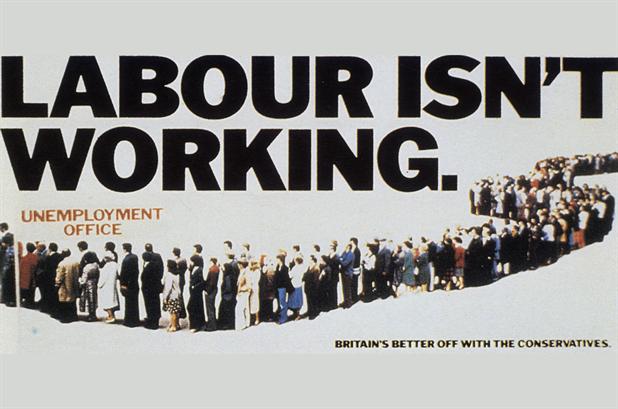I blame Saatchi & Saatchi. Thirty six years on from ‘Labour Isn’t Working’, I hold them personally responsible for the high hopes that adfolk of a certain generation (ok, mine) carry into election season. That our industry might make a definitive contribution to this, the biggest "consumer" choice of all, might intuit and electrify the mood of the times. It’s a dream that is invariably dashed.
I brook no argument with the agencies that have volunteered for duty this time around, champing at the bit as I’m sure they are for their moment in the electoral sun, for a return on their emotional and commercial investment.
No, the real villains of the piece most likely lie elsewhere in the guise of the new breed of party strategists and pollsters. Messrs. Axelrod, Crosby et al boast exceptional results from previous campaigns, good creds if you like. And one of them may yet have the last laugh after all.
But I worry that the professionalisation of our electioneering brings with it a creative downside as well as a strategic "up", in much the same way as the professionalisation of marketing – or, less controversially, the rampant growth of research – has sometimes served to undermine rather than advance our ability to make genuinely transformational leaps for brand owners.
In political circles at least, mass marketing and broadcast are out of fashion. The focus is marginal constituencies and marginal gains in those marginal constituencies. Our electoral system doesn’t just validate the strategy, it drives us there.
Add to this the daily scrutiny of polling data, and the urge to match or denigrate policies and pledges in real time, and we have a perfect storm of narrowcast and tactical campaigning rather than broad strategic sweep (The win, surely, is both?).
The irony of all of this is that political parties and their advisers are beating a path to the "what?" school of campaigning just as big brands and theirs track towards the higher ground of "why?".
Management theorist Simon Sinek’s TED talk explaining the advantage that organisations and individuals with purpose enjoy is the darling of agency planners. It should be clutched tight to creatives’ chests also.
Because brands that have found their why, or brands that were founded with one, do better work also (Think Chipotle, Google, Red Bull, Dove).
Back here at Election Bake Off, though, David is essentially promising a bigger cake, Ed a smaller one but with NEW, BIGGER SLICES! Nicola and Nige care less about the cake itself than where it’s baked and who’s eating it. Dispiriting stuff. Whoever wins, and with whatever mandate, they can’t be said to have won on "the vision thing".
I do love a brand with convictions, and I love the campaigns that they do. As Paul Feldwick has recently concluded from his exhaustive historical review of advertising best practice, as previously reported in 北京赛车pk10, they’re also the ones that enjoy the biggest returns from marketing (seems advertising is like skiing, best done with conviction or not at all).
What a shame for society, and what a shame for our industry, that our political parties, for all their inherent "category" advantage, would make neither shortlist.
Laurence Green is a founding partner of 101.


